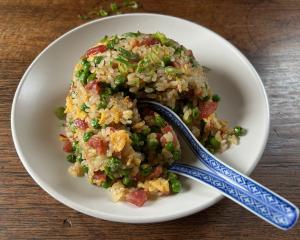Eating cheaply doesn't necessarily mean boring food or lack of flavour. Charmian Smith comes up with a few thrifty tips for eating well.
Cutting your food bill without sacrificing flavour, quality or healthiness may mean a little more thought and planning if you are used to popping into the supermarket after work or grabbing takeaways on the way home.
Sometimes it only takes a slight change in attitude to make all the difference to your weekly food budget.
Shop once a week and resist the temptation to have takeaways or a meal out on Fridays or when the cupboard is virtually empty - make pasta, frittata, omelette, soup or stir-fry with leftovers or something from the pantry instead.
There's great satisfaction in making something out of "nothing".
Think of how you spend your food money.
It makes sense to take advantage of supermarket specials if they are things you know you will use, but the supermarket is not always the cheapest place, especially for fruit and vegetables.
If you shop around the stalls at farmers markets you can find some wonderful bargains in fresh vegetables, fruit, whole fish, and some meats.
Buying vegetables and fruit in season makes sense because they are cheaper and fresher.
You'll also see what's in season at the market whereas in the supermarket you'll often find expensive, imported, out-of-season stuff.
Pottering in the kitchen from time to time at weekends or evenings may save you several hundred dollars a year without any deterioration in the quality of what you eat - in fact your diet is likely to be much healthier.
Make your own lunch - sandwiches, soup, leftover pasta or rice that can be heated in the office microwave.
Some work places have toastie pie makers in the office kitchen so bread, cheese and ham and perhaps marmite, corn or baked beans can provide a warming midday snack at minimal cost.
Keep a little coffee plunger at work if you enjoy decent coffee - it's cheaper than take-out expresso.
Make your own biscuits and muffins and take some to work, or even keep a pack of supermarket biscuits in your desk drawer so you don't feel the need to raid the office snack box and write IOUs.
Don't assume that because things are available ready-made in supermarkets they are difficult to make.
You can whip up a batch of short or rough puff pastry in the processor quickly and easily, and pizza bases, pasta sauces, dressings and soups are a doddle to make - and cheaper and healthier than most bought versions.
It's always worthwhile making twice as much and freezing some for later or eating it for next day.
Looking for inspiration?
Take a tip from ethnic food - it is based on a staple such as rice, potatoes, bread and flatbreads, pasta, polenta, tortilla, couscous, lentils, chickpeas, beans, barley or burghul, with lots of vegetables and a smaller amount of meat or fish.
Think of meat, fish and cheese as flavourings along with herbs (which are easy to grow in pots or a small garden plot), spices and condiments such as chutneys, gherkins, capers, anchovies, soy sauce, vinegar, garlic, and, of course, salt and pepper.
Learn to cook less expensive cuts of meat - there's a host of recipes for wonderful stews, casseroles and braises from all over the world.
Mince is extremely versatile and is often extended with staples such as breadcrumbs, beans, pasta, pastry or vegetables - think meatballs, chillie con carne, meat loaf, bolognaise, lasagne, patties, burgers, pies, cobblers, and bakes.
Pizza (save by making your own bases), pastas, one pot dishes and stir-fries make a little meat go a long way, as do adding beans or lentils.
A couple of slices of bacon or spicy sausages can flavour a whole dish that will feed four or six.
Such recipes easily stretch to accommodate hungry teenage appetites or extra mouths - pastas, curries, risottos and pilafs, stews, soups, stir fries, casseroles, frittatas, bakes and one-pot dishes - just add more pasta, rice, noodles or chunks of potato, kumara or other vegetables to get another serving or two out of it.
Potato wedges tossed in a little oil and roasted in a hot oven and sprinkled with salt, garlic, or a spice mix, make a hot, filling and very tasty snack instead of a bought or frozen chips.
And don't forget the old favourite, a big baked potato with a topping of mince or vegetable sauce or cheese or sour cream.
Rethink leftovers.
It has been calculated that the average family wastes hundreds of dollars worth of food a year and this has serious implications for the environment as well as the family budget.
Be aware of what you throw away.
We tend to waste an awful lot of good food.
Keep an eye on use-by dates so you can use things in time, and calculate your portions so you don't cook too much.
Make soup or stock out of the tops and outside leaves of leeks or cabbages, chicken carcasses or bones, fish skeletons, celery leaves or wilted vegetables that have been in the fridge too long.
A hearty vege soup with fresh bread or toast and a sprinkling of cheese makes a satisfying and filling meal.
Make double the amount and freeze some for those nights when you come home tired and there seems to be nothing to eat.
Bananas that are going brown too fast can make a fruit salad or a banana loaf.
If fruit is looking decidedly sorry for itself, cook it in a little water with sugar and a few spices such as cinnamon or star anise for dessert or with your breakfast muesli.
Or chop it and freeze it and use the chunks in your next smoothie.
Stale cake or bread can be turned into many wonderful dishes from bread and butter pudding to fatoush salad, or breadcrumbs and croutons to give crunch to soups or salads.
Leftovers can make the basis of a delicious meal.
We all know about grandma's cottage pie made from the leftover roast, but fritters, frittata, calzone (enclosed pizza) or toastie pies bring a whole new life to leftover vegetables.
Leftover rice and pasta are the basis for a good salad or a stir-fry.
A time-saving plan is to make one dish each night with enough left over to be the start of tomorrow's dinner.
Things such as roasted vegetables one day can be the basis of a salad, soup or frittata the next.
Cook extra rice that can be part of a stir-fry, kedgeree, pilaf or rice salad the next day, or cook extra potatoes which will give you a base for potato cakes, fish cakes, mashed potato topping for a pie, chunky or creamy potato soup - the ideas are endless.
Entertaining
Eating out can be expensive, but there's no need to stop having meals with friends.
Invite them home.
You can cook a good meal for six or eight for a fraction of the price of a restaurant meal.
Guests often bring a bottle of wine, but consider a pot-luck meal where everyone brings something.
You can either organise people to bring a certain course or take real pot luck - once we ended up with about eight wonderful salads and no pud - delicious and very healthy it was too.
And don't think you have to buy lots of cookbooks to find recipes: try the public library for cookbooks, check www.odt.co.nz or google recipes on the web, or ask friends.
Useful websites:
www.moneysavingmeals.com.au
www.foodwise.com.au
www.lovefoodhatewaste.com
www.storingandfreezing.co.uk/
www.nzs.com/new-zealand-articles/lifestyle/food-shopping-on-a-budget.html












